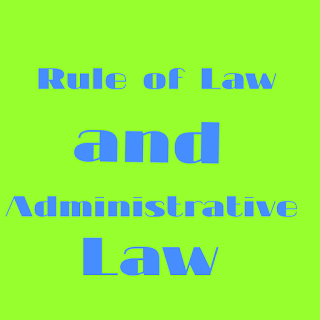Meaning and Origin:-
The rule of law is product of centuries of struggle of the people for the recognition of their inherent rights. In classical Greece Aristotle wrote that "law should be the final sovereign". In 1215, the Magna Carta checked in the corrupt and whimsical rule of king John by declaring that Government should not proceed except in accordance with the law of the land. During the thirteenth century, Thomas Aquinas argued that rule of law represents the natural order of God as ascertained through divine inspiration and human resource. In the seventeenth century, the English jurist Sir Edward Coke asserted that the "king ought to be under no man, but under God and the law." Despite in ancient history,the rule of law is not celebrated in all quarters. The English philosopher Jeremy Bentham described the rule of law " nonsense on stilts." The twentieth century has seen political leaders who have oppressed disfavoured persons or groups, without warning or reason, Governing as if no such thing as rule of law existed. For many around the world, the rule of law is essential to freedom.
The most famous exposition of the concept of rule of law has been laid down by A.V. Dicey (Law of the Constitution) who identifies three principles which together establish the rule of law :
1) Absence of arbitrary power or Supremacy of law.
2) Equality before the law.
3) The Constitution is the result of the ordinary law of the land.
Rule of law in India:-
The Constitution of India specifically provides that the state shall not deny to any person equality before the law or the equal protection of the laws. The concept of rule of law would lose all its vitality if the instrumentalist of the state are not charged with the duties of discharging their function in fair and just manner. It has been held that the rule of law pervades the Constitution as it basic features and can not be taken away even by an amendment of the constitution. In a system Governed by rule of law, discretion when conferred upon executive authorities, must be confined within clearly defined limits. This means that decision should be made by the application of known principles and rules and in general, such decisions should be predictable and citizens should know where he stands.
The Constitution lays down in part IV the directive principle of state policy. It enjoins the State to bring about a social order in which justice - social, economical and political - shall govern all the institution of national life. The rule of law promotes the lofty ideals enshrined in the directive principles of state policy and draws its sustenance from the higher judiciary, which upholds the constitutionality of laws keeping in view the philosophy of these ideals.
Basic Principles of the Rule of Law:-
1) Law is Supreme, above everything and everyone. Nobody is above the law.
2) All things should be done according to law and not according to whim.
3) No person should be made to suffer except for a distinct breach of law.
4) Absence of arbitrary power being heart and soul of rule of law.
5) Equality before law and equal protection of law.
6) Discretionary power should be exercised within reasonable limits set by law.
7) Adequate safeguard against executive abuse of power.
8) Independent and impartial Judiciary.
9) Fair and just procedure.
10) Speedy Trial.


Comments
Post a Comment